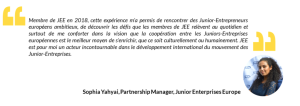July 28, 2019 marked a turning point in the world of Junior-Enterprises. All the National Confederations of Junior-Enterprises in Europe have unified their identity by adopting an identical logo and brand. After 27 years of existence, the European Confederation of Junior-Enterprises abandons its name “ JADE ” in favor of a European identity bringing together all European Juniors. JADE is now Junior Enterprises Europe .
From JADE to Junior Enterprises Europe, a confederation that continues to grow
In 1992, the CNJE ( National Confederation of Junior-Enterprises ), among 6 other European Junior-Enterprises, was at the origin of the creation of the JADE ( Junior Association for Development in Europe ), the body which federates the Junior- European companies.
At that time, the CNJE had a clear ambition: to develop the Junior-Enterprise concept internationally. Faced with the creation of European Junior-Enterprises and national confederations from 1987 such as JADE Switzerland, CEJE Junior Empresas, UniPartners, BDSU and JADE Italia, it was in 1992 that these last 5 as well as the CNJE created the JADE . Today, it brings together 365 Junior-Enterprises in 14 countries and the headquarters are in the European capital Brussels . Quickly, this new organization became an important body on a European scale which brings together Junior-Enterprises today achieving a global turnover of approximately 17 million euros. It is behind the organization of several congresses each year. Indeed, the Summer JADE Meeting and the JADE October Meeting are organized by one or more Junior-Enterprises in Europe and the JADE Spring Conference in Brussels.
In recent years, JEEurope (Junior Enterprises Europe) has had an ambition that is defined as follows: to provide as many students as possible with the unique experience of becoming a Junior Entrepreneur .
“ To empower, through the Junior-Enterprise concept, students capable and committed to generate a relevant impact ”
This is why its objective is to expand the JE concept to new countries in Europe and, ultimately, to oversee a number of 500 Junior-Enterprises in 21 European member countries by 2021. This expansion will increase and then to enrich exchanges of best practices between the various players in the movement by improving the training and knowledge-sharing processes. Ultimately, this strategy of expanding and improving Junior-Enterprises will make it possible to increase their visibility, both among students and in the professional world. The unification of the Junior-Enterprise brand will therefore aim to communicate under the same identity on different scales, while acting as a guarantee of quality, that of being a Junior-Enterprise of the European network.

The Junior-Enterprise brand, towards standardization of Junior-Enterprises
In Europe, each country has a particular organization. Some have a confederation bringing together more than 180 Junior-Enterprises, while others have no national confederation. The JEEurope network now has 11 member confederations: the CNJE, Junior Enterprises Netherlands, Junior Enterprises Germany, Junior Enterprises Italia, Junior Enterprises Switzerland, Junior Enterprises Austria, Junior Enterprises Spain, Junior Enterprises Portugal, Junior Enterprises Belgium, Junior Enterprises Poland, Junior Enterprises Romania. Also, JEEurope brings together advisory members, ie Junior-Enterprises that do not have a national confederation, such as: HandelsConsulting in Sweden, Next in Croatia, Westminster Business Consulting in the United Kingdom.
Today, the CNJE is the confederation that brings together the largest number of Junior-Enterprises. Its objective is to develop the Junior-Enterprise brand by promoting it and creating new structures. This confederation has a real impact within French Junior-Enterprises since it has a support role by carrying out annual audits and training. Also, some members of the CNJE, including the President, are full-time, which allows them to develop the confederation continuously.
Other confederations such as Junior Enterprises Netherlands have, like the CNJE, a very unifying operation. The Confederation of the Netherlands has a system based on exchange and openness. Thus, all Junior-Enterprise information will be shared with others in order to have total transparency and efficient collaboration to progress and be more efficient. Junior Enterprises Germany seeks, for its part, to stimulate its Junior-Enterprise members with quantified objectives. The objective is to have powerful structures which achieve turnover and which are of excellent quality. It is their guarantee of notoriety.
However, some countries like the United Kingdom, which has the smallest number of structures, find it difficult to establish the Junior-Enterprise brand in their economic environment.
It is here that the year 2019 is decisive. The change of denomination of all the national confederations will make it possible to harmonize the European movement and create unity. This modification is at the initiative of the European confederations which, for several years, have wanted to standardize all the confederations in order to have a real impactful identity with economic and public players. Each European confederation will no longer be a singular entity but will be part of a much larger entity federated by Junior Enterprises Europe. This brand will be a communication lever for European Junior-Enterprises. The unification of the brand indicates a certain rapprochement between the European confederations and an increase in joint projects between the confederations and the Junior-Enterprises. The European movement can now move forward and seek to have real weight with economic players and public institutions.
The international as a new horizon for Junior-Enterprises
While many Junior-Enterprises nowadays rely on international development, ESCadrille has been a pioneer in terms of launching an international development strategy within the French national movement.
ESCadrille is today the most international Junior-Enterprise of the French JE network. This is the result of a major internationalization strategy implemented in 2011 . ESCadrille has quickly established itself as an international reference thanks to the many partnerships forged with the best foreign Junior-Enterprises. Today, ESCadrille has 8 international partners eJoventud, JED Consulting, CCT, JEME, LSM Conseil, Conquest, JEG, WBC, of which the last 6 JE are members of J7 , a restricted network of 7 renowned European Junior-Enterprises wishing to consolidate their cooperation and their services on an international scale. These partnerships give us the opportunity to offer our clients studies of international scope.
Indeed, this advantage allows us to carry out studies with an international dimension by carrying out subcontracting phases to our Junior-Enterprise partners when it comes to carrying out a quantitative analysis of the market. This network of international partners offers ESCadrille a certain reactivity in carrying out studies with an international dimension because our Junior-Enterprise partners are used to working with us.

The avant-garde international policy of ESCadrille has been rewarded many times by JEEurope with the Most International Junior-Enterprise prize. This prize rewards a JE for its desire to carry out business internationally, ie the number of studies carried out, customer satisfaction following the study and the quality of the final report. This thus testifies to the know-how of ESCadrille in the realization of this type of more complex study.
In addition, always with a view to strengthening our services internationally, ESCadrille regularly organizes exchange weekends with its partners. These weekends allow us to exchange best practices, to continually rethink and improve our cooperation and, of course, to forge the links that are essential for good professional understanding. In 2019, Conquest, Polish Junior-Enterprise and ESCadrille were able to meet in Toulouse for a new Exchange Weekend to share our experiences and best practices.
But Escadrille did not stop there. The International Manager of ESCadrille, Sophia Yahyai, from the 2018 mandate, was part of the JEEurope organization as Partnership Manager. This was an opportunity for her in particular to develop the network of the European Confederation by negotiating and signing new partnerships.
An international strategy highly achieved and which will continue to develop…
To find out more about our international services.
